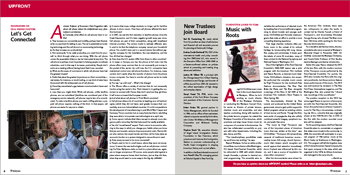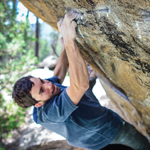CONDUCTOR LOOKS TO FILM
 Angel Gil-Ordóñez wears many hats in the music department at Wesleyan. When he isn’t working as music director of the Wesleyan Orchestra or conducting the Wesleyan Concert Choir, he serves as director of private lessons, chamber music and ensembles, and also teaches conducting. Along with teachers in the private lessons program, he created the Wesleyan Ensemble of the Americas, which premieres and plays lesser known music by composers of countries in the Americas. He also has collaborated successfully on projects with other departments, including theater, dance, and film.
Angel Gil-Ordóñez wears many hats in the music department at Wesleyan. When he isn’t working as music director of the Wesleyan Orchestra or conducting the Wesleyan Concert Choir, he serves as director of private lessons, chamber music and ensembles, and also teaches conducting. Along with teachers in the private lessons program, he created the Wesleyan Ensemble of the Americas, which premieres and plays lesser known music by composers of countries in the Americas. He also has collaborated successfully on projects with other departments, including theater, dance, and film.
“The interdisciplinary possibilities make my work here very exciting,” he says.
Beyond Wesleyan, he has an active professional life as music director of the Washington, D.C.-based Post-Classical Ensemble, which he cofounded in 2003 with artistic director Joseph Horowitz, a pioneer in classical musical programming. The ensemble aims to revitalize the performance of classical music by breaking free of more traditional programming to attract broader and younger audiences. Gil-Ordóñez and Horowitz create programs that make an effort to provide a more compelling listening experience.
Their large chamber orchestra often performs music in the context of its cultural heritage by incorporating folk song, dance, film, poetry, and commentary. It draws upon the talents of some 50 musicians, many of them soloists for the National Symphony and National Opera in Washington, D.C.
One of the highlights of the Post-Classical Ensemble’s 2004–2005 season was a joint program with the American Film Institute and Naxos Records, a classical music label. Under Gil-Ordóñez’s direction, the ensemble performed the complete music scores by Virgil Thompson for two landmark New Deal-era documentaries, The Plow That Broke the Plains and The River, alongside screenings of the films in fall 2005 at the American Film Institute’s Silver Theatre in Silver Spring, Md.
The documentaries, directed by Pare Lorentz and produced by the United States government, strove to gain public support for federal programs aimed at assisting victims of dust storms and floods. Though the films were works of propaganda, they also artfully combined powerful imagery, symphonic music, and poetic free verse.
“The music by Virgil Thompson was one of the important pieces of American music that was written at the time,” says Gil-Ordóñez. “Thompson did extraordinary research of traditional American music—cowboy tunes, folk songs, church hymns—music that viewers would recognize and would capture their attention immediately. Aaron Copland was influenced by this music, and it was a source of inspiration for many other composers.”
After the documentaries were shown for the American Film Institute, there were two colloquiums to place the works in context led by Charles Fussell, a friend of Thompson’s, and documentary filmmaker George Stoney, who showed The River more than 100 times while working for the Farm Security Administration.
For a benefit to aid Katrina victims, the documentaries also were screened at Wesleyan’s Memorial Chapel in November 2005. Gil-Ordóñez conducted the Wesleyan Orchestra, and Corwin-Fuller Professor of Film Studies Jeanine Basinger provided an introduction.
Earlier this year, Naxos released the DVD of the two films with the modern versions of the Thompson scores performed by the Post-Classical Ensemble. For purists, the DVD also includes the films with the original soundtracks, but these versions feature lesser performances of the music. The DVD was well-received by reviewers in The New York Times, Gramophone magazine, and The Washington Post, who praised the ?vibrant new recordings of the soundtracks.?
The positive reception to the DVD has encouraged Naxos to sponsor a future project with the Post-Classical Ensemble, this time a live performance of Aaron Copland?s score for The City, a documentary contrasting city life vs. suburbia that was originally shown at the 1939 World?s Fair. A DVD of the film with the modern recorded score also will be released.
For its upcoming season, the Post-Classical Ensemble plans to concentrate on programs that relate more closely to the community. In 2008, the ensemble will participate in a special program of 19th-century music at the Music Center at Strathmore in Washington, D.C. This program will tell the forgotten story of the Colored American Opera Company, the first opera company in the area, which was organized in the 1870s by African Americans who belonged to the same church.

